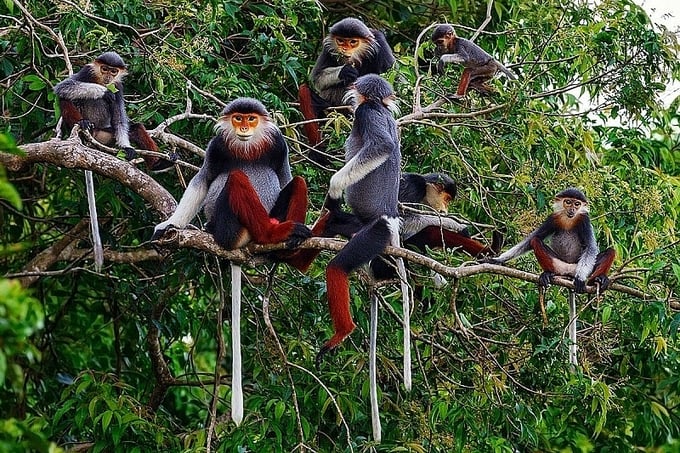May 20, 2025 | 03:45 GMT +7
May 20, 2025 | 03:45 GMT +7
Hotline: 0913.378.918
May 20, 2025 | 03:45 GMT +7
Hotline: 0913.378.918
The National Biodiversity Conservation Plan for the period 2021 - 2030, with a vision toward 2050, aims at protecting and developing ecosystems, wildlife species, and valuable genetic resources.
The overall goal of the plan is to increase the area, restore, and ensure the integrity of natural ecosystems, as well as connect existing protected areas for effective management and conservation. Additionally, it emphasizes creating a system of nature reserves, biodiversity corridors, and important wetlands, contributing to climate change response and sustainable development for the country.

Expanding, upgrading, and improving the management effectiveness of the nature reserve system.
Expanding, upgrading, and improving the management effectiveness of the nature reserve system is a specific goal of the plan. This includes establishing 61 new protected areas, transitioning 178 existing reserves (of which 7 will be upgraded and 27 expanded), and increasing the total area of protected sites nationwide to approximately 6.6 million hectares. Additionally, 13 existing biodiversity conservation facilities will continue, while nine new facilities will receive certification. Furthermore, the system will include seven new biodiversity corridors and 10 nationally important wetlands.
A system of high-biodiversity regions and ecologically significant landscapes will also be established, consisting of 22 areas spanning about 2 million hectares, and 10 ecological landscapes covering approximately 4 million hectares. These areas hold significant value for the conservation of rare species and genetic resources, as well as for protecting natural ecosystems.
To 2050, the plan envisions the effective restoration and conservation of critical natural ecosystems and endangered species. Biodiversity and ecosystem services will be evaluated and sustainably utilized, providing essential economic and social benefits, ensuring environmental security, and enabling proactive climate change adaptation, thus contributing to sustainable development.
To achieve this goal, the plan will be implemented across eight ecological regions throughout the country, including the Northeast, Northwest, Red River Delta, North Central, South Central, Central Highlands, Southeast, and Mekong Delta regions. This regional division allows each area to carry out conservation activities suited to local ecological characteristics, facilitating flexible and effective biodiversity conservation solutions.
Eight key solutions are proposed, encompassing policy mechanisms, training and capacity building, finance and investment, community awareness and education, international cooperation, implementation and monitoring.
One crucial solution is to promote scientific research on the conservation and sustainable use of biodiversity. This research will focus on developing models for breeding and reintroducing wildlife, conserving endemic and endangered species, and preventing the decline of species at risk of extinction.
The application of remote sensing technology and geographic information systems (GIS) in monitoring is also emphasized to ensure transparency and effectiveness in managing conservation areas. A model for community involvement in conservation will be developed and expanded to help the local understands and contributes to biodiversity conservation efforts.
Additionally, the enforcement of biodiversity conservation laws will be strengthened, especially for organizations, individuals, and communities living in areas with high biodiversity.
Translated by Kieu Chi

(VAN) As a doctoral student doing research on renewable energy and electrification at Harvard University, the author shares his musings on electricity, nature, and countryside memories.

(VAN) The decree on Extended Producer Responsibility (EPR) ensures transparent management and disbursement of support funds, avoiding the creation of a “give-and-take” mechanism.

(VAN) Hue City rigorously enforces regulations regarding marine fishing and resource exploitation, with a particular emphasis on the monitoring of fishing vessels to prevent illegal, unreported, and unregulated (IUU) fishing.

(VAN) Hanoi People's Committee has issued a plan on reducing greenhouse gas emissions in the waste management sector with 2030 vision.

(VAN) Vietnam's draft amendment to Decree No. 156 proposes a mechanism for medicinal herb farming under forest canopies, linking economic development to population retention and the sustainable protection and development of forests.

(VAN) In reality, many craft village models combined with tourism in Son La have proven effective, bringing significant economic benefits to rural communities.

(VAN) The international conference titled Carbon Market: International experiences and recommendations for Vietnam was successfully held recently in Ho Chi Minh City.